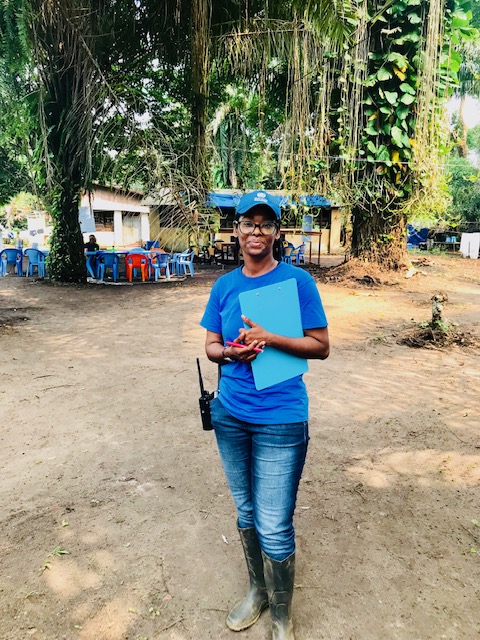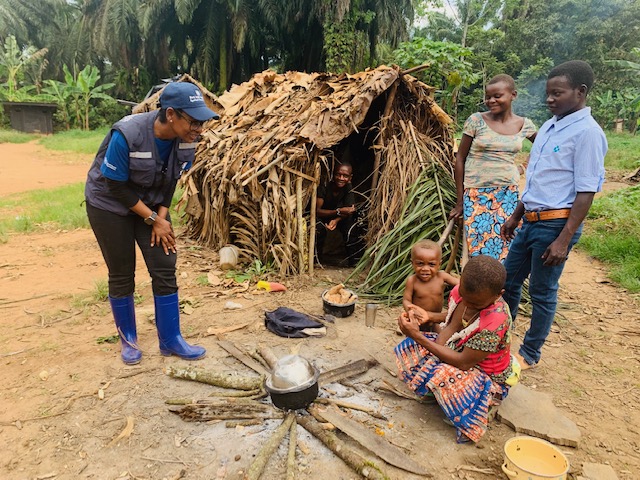Dr. Marie-Roseline Darnycka Bélizaire has made it her mission to serve communities most in need of help. Her work in the field not only involves dealing with epidemics but also sometimes war. So, how does she continue to work with the same fervor and passion? Read more to find out.
Dr. Marie-Roseline Darnycka Bélizaire has spent years working in community medicine. As a field coordinator for the prestigious World Health Organization, she has been at the forefront of Ebola Response and is now helping stop the spread of COVID-19 in the Central African Republic. However, she didn’t always have an interest in medicine. What she did care about though, was finding a career that would allow her to be of service to others.
“I always told my family that whatever I would do with my life, whatever would be my career I will do it for service”
At the age of only 17 years, Dr. Bélizaire lost her father. She recalls that in that moment along with dealing with the loss of a parent, she had to deal with feelings of confusion. Her family was unaware of the medical terminologies or the reasoning behind her father’s illness and death.
“I was very shocked. It was a very difficult moment for my family. I felt very uncomfortable with my family’s suffering around me, and I couldn’t give them information about what happened to my father. So, at that moment I thought that if I were a medical doctor, I could at least give them the information of what my father had or why he was dying.”
It is a basic human right for a person to know or understand the reason for their loved one’s death. However, Dr. Bélizaire and her family were left without any information.
“It was like swimming in the pool without knowing where we were going.”
At that moment, she decided she wanted to help all those in the same position as her family, struggling with grief and loss. She believed that access to health care was not just a choice, but the basic human right people rightly deserved. And so, she decided to enter the field of medicine and not only become a public health leader but also an advocate for the vulnerable.
“By choosing this career I wanted to contribute to improving the lifestyle and health of people in my country and wherever my profession would take me. I also wanted to become a medical doctor and a public health leader so I could advocate for the vulnerable.”
“My Job is Still My Greatest Passion Ever”

Dr. Bélizaire’s work often takes her to the most remote areas, often only accessible through helicopters. As an epidemiologist, a public health expert, and an Emergency Field Coordinator at WHO, she often risks everything to deliver healthcare to the underprivileged communities.
“The mission I embraced since day one: my devotion to serve others and to serve those in need of public health. I think the purpose of my mission as a physician and public health worker is still valued, so on the planet we are very far from considering health care as a human right. I can’t lower my arms yet, I think, and I have to continue with the same dynamism till the end of my career.”
It is this passion that has managed to fill her career with hundreds of special moments that she deeply cherishes. However, for her, the greatest moment has always been ending epidemics in the communities she serves.
“I feel very happy, fulfilled celebrating the end of epidemics. This moment of success represents the culmination of endless hard work with days without sleep”
She feels the most fulfilled knowing that her work has contributed to not only saving lives, but also bringing joy to a community. That, for her, is a job well done.
“I also enjoy the moment celebrating my stand with the communities you know. For example, in Africa they celebrate with dancing, with singing, and distributing food in the community. So, I really enjoy seeing the community feel safe because of my contribution or because epidemics are over.”
Dealing with Threats and Stress
Dr. Bélizaire’s work in the field often puts her in difficult situations and varying levels of threats. She believes that a mistrust in the community is often the starting point of these security threats. Which is why she works with the community leaders to build trust in the community and prevent the development of these threats.
“Other things that we do is to not take unnecessary risks. We have a risk team that updates us about the situation, and we also work with our local authorities that support us in the work. We go together with them in the field so we can minimize the impact of those insecurities in the work that we are doing.”
Her staff’s mental health is of the utmost priority for Dr. Bélizaire. Which is why she ensures to include psychologists in her team who are able to support the mental health of her colleagues.
“Another thing we do to maintain our mental health is do a focus group between our colleagues, so we can share our experience. For example, if I am working in the field, I have an obligation to hear from them and also try to make them secure. To give them the assurance that we are together in this and that they’re not alone. This helps us travel forward every time.”
The pandemic seems to have added further stress on the lives of all healthcare workers like Dr. Bélizaire. In a pre-pandemic world, she would often be found spending her time working with various communities, towards improving their access to healthcare. Other days she would spend her time in libraries, immersing herself in the world of books. Or visiting new places and connecting with nature. But now she’s switched to other ways of de-stressing.
“Nowadays I’m doing a lot of workouts at home. I also discovered a lot of things about yoga, and I continue to read a lot. I always read a lot, but now I’m focusing on reading personal development books that are helping me find the best version of myself.”
Moreover, she spends her nights connecting with her family and friends all over the world. This helps her stay connected with their lives and also works as an outlet for her to share her experiences and thoughts with others.
“I think nowadays in COVID I involve myself in e-learning platforms to develop new skills and keep myself busy. I love to keep my mind busy, so you don’t have time to have negative thoughts. You always think positively.”
Advice to Medical Students
Dr. Bélizaire believes that if one wants to revolutionize the world of medicine, they shouldn’t be afraid to leave their comfort zones. Because that’s when they’ll see the different aspects and perspectives of medical practice all around the world.
“They have to take risks. To be curious, innovative, creative in whatever they are doing, and they should do it to serve others.”
Moreover, she pushes medical students to develop a habit of reading and surrounding themselves with knowledge.
“I would tell young medical doctors to read as much as they can. Reading is power. Reading is knowledge. Not only medical books, but all those books that can contribute to their personal development and find them to discover their best selves.”
Most importantly, Dr. Bélizaire emphasizes the need for young medical doctors to work within the community, in the field, and towards the betterment of others.
“Finally, my message to them would be that they should know their own values and choose experience as a background value. So, they have to build on that excellence as value to empower themselves and empower others around them.”




